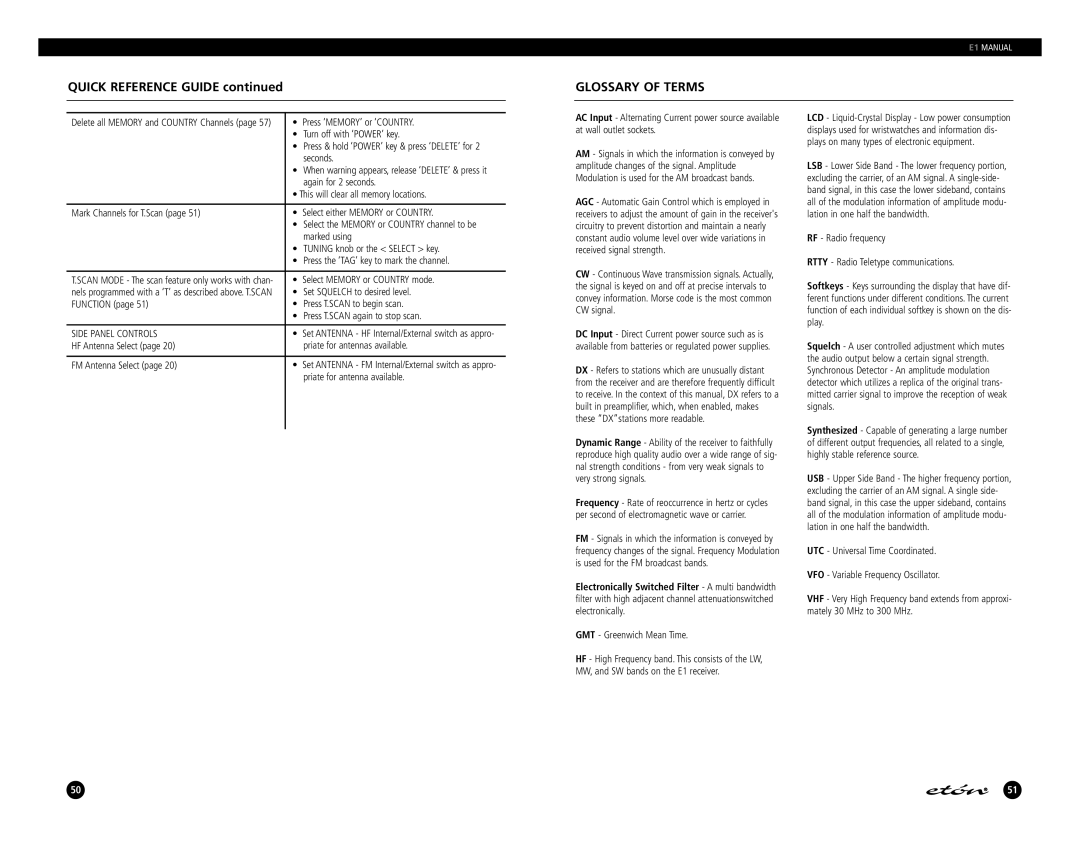
QUICK REFERENCE GUIDE continued
E1 MANUAL
GLOSSARY OF TERMS
Delete all MEMORY and COUNTRY Channels (page 57) | • | Press ‘MEMORY’ or ‘COUNTRY. |
| • Turn off with ‘POWER’ key. | |
| • Press & hold ‘POWER’ key & press ‘DELETE’ for 2 | |
|
| seconds. |
| • When warning appears, release ‘DELETE’ & press it | |
|
| again for 2 seconds. |
| • This will clear all memory locations. | |
|
|
|
Mark Channels for T.Scan (page 51) | • | Select either MEMORY or COUNTRY. |
| • | Select the MEMORY or COUNTRY channel to be |
|
| marked using |
| • | TUNING knob or the < SELECT > key. |
| • Press the ‘TAG’ key to mark the channel. | |
|
|
|
T.SCAN MODE - The scan feature only works with chan- | • | Select MEMORY or COUNTRY mode. |
nels programmed with a ‘T’ as described above. T.SCAN | • | Set SQUELCH to desired level. |
FUNCTION (page 51) | • | Press T.SCAN to begin scan. |
| • Press T.SCAN again to stop scan. | |
|
|
|
SIDE PANEL CONTROLS | • | Set ANTENNA - HF Internal/External switch as appro- |
HF Antenna Select (page 20) |
| priate for antennas available. |
|
|
|
FM Antenna Select (page 20) | • | Set ANTENNA - FM Internal/External switch as appro- |
|
| priate for antenna available. |
|
|
|
AC Input - Alternating Current power source available at wall outlet sockets.
AM - Signals in which the information is conveyed by amplitude changes of the signal. Amplitude Modulation is used for the AM broadcast bands.
AGC - Automatic Gain Control which is employed in receivers to adjust the amount of gain in the receiver's circuitry to prevent distortion and maintain a nearly constant audio volume level over wide variations in received signal strength.
CW - Continuous Wave transmission signals. Actually, the signal is keyed on and off at precise intervals to convey information. Morse code is the most common CW signal.
DC Input - Direct Current power source such as is available from batteries or regulated power supplies.
DX - Refers to stations which are unusually distant from the receiver and are therefore frequently difficult to receive. In the context of this manual, DX refers to a built in preamplifier, which, when enabled, makes these “DX”stations more readable.
Dynamic Range - Ability of the receiver to faithfully reproduce high quality audio over a wide range of sig- nal strength conditions - from very weak signals to very strong signals.
Frequency - Rate of reoccurrence in hertz or cycles per second of electromagnetic wave or carrier.
FM - Signals in which the information is conveyed by frequency changes of the signal. Frequency Modulation is used for the FM broadcast bands.
Electronically Switched Filter - A multi bandwidth filter with high adjacent channel attenuationswitched electronically.
GMT - Greenwich Mean Time.
HF - High Frequency band. This consists of the LW, MW, and SW bands on the E1 receiver.
LCD -
LSB - Lower Side Band - The lower frequency portion, excluding the carrier, of an AM signal. A
RF - Radio frequency
RTTY - Radio Teletype communications.
Softkeys - Keys surrounding the display that have dif- ferent functions under different conditions. The current function of each individual softkey is shown on the dis- play.
Squelch - A user controlled adjustment which mutes the audio output below a certain signal strength. Synchronous Detector - An amplitude modulation detector which utilizes a replica of the original trans- mitted carrier signal to improve the reception of weak signals.
Synthesized - Capable of generating a large number of different output frequencies, all related to a single, highly stable reference source.
USB - Upper Side Band - The higher frequency portion, excluding the carrier of an AM signal. A single side- band signal, in this case the upper sideband, contains all of the modulation information of amplitude modu- lation in one half the bandwidth.
UTC - Universal Time Coordinated.
VFO - Variable Frequency Oscillator.
VHF - Very High Frequency band extends from approxi- mately 30 MHz to 300 MHz.
50
51
